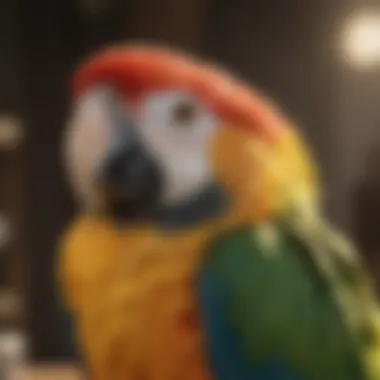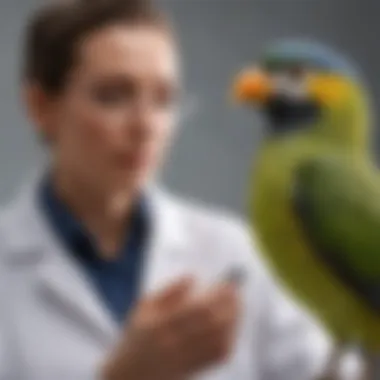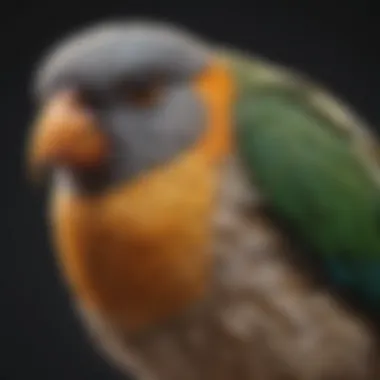Vitamin D Supplement for Birds: Essential Insights for Avian Health


Intro
Vitamin D plays a crucial role in avian health. This article aims to provide pet owners with a thorough understanding of the importance of vitamin D supplementation for their birds. By exploring the role of vitamin D in avian physiology, the potential signs of deficiency, dietary sources, and safe supplementation practices, pet owners can make informed decisions that will enhance their bird's quality of life.
Understanding Your Pet
Pet Behavior Basics
Birds exhibit unique behaviors that are influenced by various factors, including species, environment, and health. Understanding these behaviors contributes to their overall well-being. For instance, certain species, such as parrots, are social and often require interaction. Others, like finches, may prefer solitude. Paying attention to these traits is vital for proper care.
Common Breed Characteristics
Different bird breeds have distinct characteristics. Parrots, for example, are known for their intelligence and need for mental stimulation. Canaries are often more reserved, thriving on routine. Recognizing these traits can help owners tailor their approach to care. This also includes understanding their specific dietary needs, especially regarding vitamin D intake.
Species-Specific Needs
Vitamin D requirements can vary between species. Birds like budgerigars often require less vitamin D than larger species like macaws. It's critical for pet owners to research their bird's species to determine the appropriate levels of supplementation, ensuring optimal health.
Vitamin ’s Role in Avian Health
Understanding vitamin D's function in birds is essential. It helps in calcium absorption, which is vital for bone health and egg production. A deficiency in vitamin D can lead to serious health issues, such as rickets in young birds.
“Vitamin D is not just a nutrient; it is integral to bird health, affecting bones and immune functions.”
Consequences of Deficiency
Deficiency can manifest in various forms, including weakened bones, lethargy, and poor feather condition. Birds that do not receive adequate sunlight exposure are particularly at risk. Owners must be vigilant in observing their pets for these signs, as they can develop quickly and lead to long-term problems.
Dietary Sources of Vitamin
Birds obtain vitamin D primarily from their diet and sunlight. Foods rich in this vitamin include:
- Fortified pellets
- Leafy greens such as kale and spinach
- Fatty fish like salmon
- Certain seeds and nuts
Supplementation through these dietary sources should be a priority for pet owners to ensure their birds receive adequate vitamin D.
Methods of Supplementation
When direct sunlight is limited, artificial supplementation becomes necessary. This can be achieved through:
- Vitamin D3 supplements, often in liquid form to mix with food
- UVB lighting, which can simulate sunlight in indoor settings
Both methods demand careful consideration to avoid overdose.
Safety Considerations
As with many supplements, the risk of overdose exists. It's essential for pet owners to follow dosage recommendations closely. Regular consultations with avian veterinarians can provide key insights on safe practices and individual bird needs.
Professional Recommendations for Avian Care
Avian veterinarians often highlight the importance of regular health check-ups. These visits allow for monitoring overall health and specific nutrient levels, including vitamin D. By staying informed and proactive, pet owners can significantly improve their bird's quality of life through thoughtful dietary management and supplementation.
Epilogue
Vitamin D is critical for the health of birds. By understanding their specific needs, observing behavior, and implementing safe supplementation practices, pet owners can ensure their birds lead healthy lives. Education on nutrition is key to nurturing pet birds, providing them a better chance for longevity and well-being.
Prelims to Vitamin in Avian Species
Vitamin D is a crucial nutrient for the health of many living beings, including birds. Understanding its role in avian species forms the foundation of our overall discussion on Vitamin D supplementation for pet birds. A lack of adequate Vitamin D can lead to severe health issues, making it essential for pet owners to grasp the significance of this vitamin in their birds' diets.


Defining Vitamin and Its Importance
Vitamin D is a fat-soluble vitamin that plays multiple roles in the body, primarily concerning calcium and phosphorus metabolism. In birds, its importance is magnified as it influences bone health and immune function. Deficiencies in Vitamin D lead to rickets or osteomalacia, conditions characterized by weakened bones and impaired growth.
The synthesis of Vitamin D mainly occurs through exposure to sunlight. Birds need ultraviolet B (UVB) radiation for their skin to produce this vitamin effectively. In captivity, many pet birds may not receive adequate sunlight, making supplementation critically important.
Furthermore, Vitamin D also supports the immune response, which is vital for maintaining health in avian species. As we dive deeper into the physiological roles of Vitamin D, its impacts on metabolism and disease resistance will also become clear.
Understanding the fundamentals of Vitamin D will aid pet owners in making informed dietary choices sufficient for promoting the well-being of their avian companions. In this section, we lay the groundwork for discussing Vitamin D sources, requirements, and deficiencies in birds, emphasizing the need for conscientious avian care.
Physiological Role of Vitamin in Birds
Vitamin D plays a crucial part in the overall health and well-being of birds. Its roles extend beyond simple mineral absorption; vitamin D influences several physiological functions vital for birds to thrive in their environments. A deep understanding of the physiological role of vitamin D in avian species can empower pet owners to make informed decisions regarding supplementation.
Calcium Absorption and Bone Health
Vitamin D is essential for efficient calcium absorption. Calcium is a fundamental mineral that supports healthy bone structure and function. In birds, a lack of sufficient vitamin D can lead to issues like rickets or osteoporosis. These conditions weaken bones, increasing the likelihood of fractures and other injuries. Birds that do not receive adequate levels of calcium often show signs of discomfort and decreased mobility.
Regular exposure to sunlight helps facilitate vitamin D synthesis in a bird’s body. However, in indoor settings, where birds may not get enough natural sunlight, ensuring they receive proper vitamin D through supplements or fortified foods is critical. Supplementing vitamin D can lead to improved calcium uptake and stronger bones.
Immune Function and Disease Resistance
A well-functioning immune system is vital for preventing diseases. Vitamin D plays a significant role in immune function by modulating both innate and adaptive immune responses. This modulation helps in activating immune cells that protect the bird from various pathogens. Birds with insufficient vitamin D levels may be more susceptible to infections and illnesses. Thus, ensuring that your bird receives the right amounts of vitamin D can enhance its overall health and resistance to diseases.
Incorporating vitamin D into an avian diet can bolster immune activity, making the birds less prone to common ailments. This is particularly important for pet birds that are kept in environments with higher risks of exposure to pathogens.
Metabolic Processes Involvement
Vitamin D contributes to numerous metabolic processes in birds. It is involved in the regulation of various enzymes that influence metabolism, including those related to energy expenditure and nutrient utilization. By regulating these processes, vitamin D indirectly affects a bird's growth, weight management, and overall energy levels.
Without sufficient vitamin D, metabolic imbalances may occur, resulting in weight fluctuations and lethargy. Pets that demonstrate changes in appetite or energy levels might be signaling a deficiency in essential nutrients like vitamin D.
In summary, the physiological role of vitamin D in birds encompasses vital areas such as calcium absorption and bone health, immune function enhancement, and metabolic process regulation. Understanding these roles allows pet owners to appreciate the significance of maintaining adequate vitamin D levels in their birds.
Sources of Vitamin for Birds
Understanding the sources of vitamin D for birds is crucial for maintaining their overall health. Vitamin D plays a critical role in various bodily functions, including calcium metabolism and bone health. Without adequate sources of vitamin D, pet birds may face significant health risks.
Natural Sources in the Environment
Birds naturally obtain vitamin D through various mechanisms, primarily from sunlight. Exposure to ultraviolet B (UVB) rays facilitates the synthesis of vitamin D3 (cholecalciferol) in their skin. This process is essential for the birds that live in environments with sufficient sunlight.
In addition to sunlight, certain foods serve as viable sources of vitamin D. Foods rich in vitamin D include:
- Fatty fish, such as salmon and mackerel
- Cod liver oil
- Fortified foods, like some brands of oatmeal and plant-based milk
- Egg yolks
It is essential for bird owners to know that the availability of these natural sources might fluctuate, influenced by changes in seasonal light or habitat conditions. Ensure ample sunlight access and consider diverse dietary options to meet the vitamin D needs.
Supplements Available for Pet Birds
While natural sources are vital, sometimes they may not suffice. This is especially true in indoor environments where sunlight exposure is limited. In such cases, vitamin D supplements can be a crucial tool for bird owners.
Several types of vitamin D supplements are designed specifically for avian species. Common forms include:
- Vitamin D3 Drops: These drops can be added directly to bird food or water. They provide precise dosing, making it easier to monitor the amount your bird receives.
- Powdered Supplements: These can be mixed into the bird's diet for easy incorporation. However, it's vital to follow the recommended dosage closely to avoid over-supplementation.
- Pellets formulated for specific species: Many commercial bird pellets are enriched with essential vitamins and minerals, including vitamin D. Choosing a high-quality brand can help ensure your bird's nutritional balance.
It is recommended to consult with a veterinarian before starting any supplementation plan. This can help tailor the right choice for your bird's specific requirements, thus enhancing their health and well-being.
Ensuring that birds have adequate access to vitamin D is a priority for their health, especially for those in controlled environments.
Assessing Vitamin Requirements in Birds


Understanding the vitamin D requirements in birds is essential for ensuring their health and wellness. Adequate vitamin D levels are critical for calcium absorption, bone development, and overall metabolic functions. However, the needs can vary significantly between different species. It is vital for pet owners and bird enthusiasts to assess these requirements accurately. This section aims to analyze key factors that influence vitamin D needs and highlights species-specific variations.
Factors Influencing Vitamin Needs
Several factors come into play when determining the vitamin D needs of birds. Not all birds require the same amount, and a detailed assessment can lead to better health outcomes. Here are some influential factors:
- Age: Young birds may have different requirements than adult birds. Their rapid growth needs adequate vitamin D to develop strong bones.
- Diet: The diet plays a crucial role. Birds fed with commercial pellets may have sufficient vitamin D, while those on seed diets may lack this essential nutrient.
- Sunlight Exposure: Natural sunlight helps birds synthesize vitamin D through their skin. Birds kept indoors may not get enough sunlight, necessitating supplementation.
- Health Status: Birds with health issues may have altered vitamin D metabolism. Illness can affect absorption and usage within the body.
- Geographical Location: Birds living in regions with limited sunlight may have higher vitamin D needs, especially during darker months of the year.
These factors together create a complex picture regarding vitamin D needs in birds. A proper assessment is crucial for delivering tailored care.
Species-Specific Vitamin Requirements
Different species of birds present unique challenges and needs regarding vitamin D. While some birds can synthesize this vitamin efficiently, others struggle. Here’s a brief look at some common species:
- Parakeets: Typically require moderate levels of vitamin D due to their varied diets. Ensuring they get enough sunlight helps meet their needs.
- Cockatiels: These birds also thrive on a balanced diet with proper exposure to sunlight. They benefit significantly from vitamin D supplements during winter months.
- Canaries: Canaries have slightly higher vitamin D requirements. It is essential to provide adequate nutrition to maintain their health.
- Larger Birds: Birds like macaws may derive sufficient vitamin D through their diet, but they may require tailored supplementation if their diet is lacking.
Each species has its characteristics that affect vitamin D absorption and usage. Therefore, pet owners should consult with a veterinarian to determine the appropriate supplementation across different bird species.
Important Note: Always consider the specific requirements of your bird species. This prevents deficiencies and promotes optimal well-being.
Consequences of Vitamin Deficiency
Vitamin D deficiency is a critical concern in avian health. A lack of sufficient vitamin D can lead to serious health issues in birds. Understanding the consequences of this deficiency helps pet owners make informed decisions about their birds' diet and health care.
Impact on Bone Development
One of the most significant impacts of vitamin D deficiency in birds is on bone development. Vitamin D plays a vital role in calcium metabolism. Without adequate vitamin D, calcium absorption decreases. This can lead to soft, brittle bones. Young birds may experience improper growth. In extreme cases, deformities may occur. Birds that lack strong bones may be more prone to fractures and injuries. Therefore, ensuring adequate vitamin D intake is essential for maintaining healthy bone structure in avian species.
Effects on Metabolism and Growth
Vitamin D is not only critical for bone health but also significantly affects metabolism and growth rates. Birds with reduced vitamin D levels often show stunted growth. The overall metabolic processes become less efficient, leading to potential weight loss and poor energy levels. A well-balanced diet that includes adequate vitamin D supports normal metabolic rates, allowing birds to grow and thrive. Owners should be aware that poor growth and lethargy can indicate a lack of this crucial vitamin.
Symptoms and Signs of Deficiency
Recognizing the symptoms of vitamin D deficiency is crucial for early intervention. Common signs may include:
- Loss of appetite
- Weight loss
- Weakness or lethargy
- Considerable feather loss or poor feather condition
- Bone deformities in growing birds
Pet owners should monitor these signs closely. If any appear, consulting a veterinarian is advisable. Early diagnosis can lead to better health outcomes for the bird.
Prompt attention to vitamin D deficiency can significantly improve quality of life for affected birds.
Methods of Administration of Vitamin
Vitamin D plays a critical role in avian health. Its administration should be approached thoughtfully to maximize benefits without risking adverse effects. Proper methods of administration ensure that birds receive adequate levels of vitamin D for their overall well-being. A well-considered approach can make a significant difference in the health and vitality of pet birds.
Dietary Supplements and Inclusion
Dietary supplements are a primary method for providing vitamin D to birds. These supplements are available in various forms, such as powders, pellets, or liquids. Here are some important points to consider:
- Formulation: Selecting a high-quality vitamin D supplement is crucial. Look for products designed specifically for birds to ensure proper absorption and effectiveness.
- Integration into Diet: It is essential to include vitamin D in a bird's diet rather than relying solely on sunlight or natural sources. Many pet birds, especially those kept indoors, may not receive sufficient exposure to UVB rays, which are necessary for natural vitamin D synthesis.
- Dosage: Administering the correct dosage is vital. Over-supplementation can lead to toxicity, while under-supplementation may result in deficiency. Always check with a veterinarian for the appropriate dosage based on species and health status.
- Monitoring: Observing changes in bird behavior and overall health can help assess the effectiveness of the supplementation. Adjustments may be necessary based on individual needs.
Incorporating vitamin D supplements into a bird's diet can significantly help in maintaining their health. However, careful monitoring and consultation with avian veterinarians are recommended for best outcomes.
Topical Applications and Others
Topical applications of vitamin D are less common but can be effective in specific cases. This method involves applying vitamin D directly to the skin or feathers of birds. Some important aspects include:
- Usage Scope: Topical applications may be recommended if dietary supplementation is inadequate or if a bird has specific health conditions affecting its ability to absorb nutrients from food.
- Ease of Application: Applying vitamin D topically can be straightforward. However, pet owners should ensure that the product is suitable for birds and follow instructions closely to avoid any mishaps.
- Consideration of Species: Different bird species may respond differently to topical applications. Consulting with a veterinarian who is knowledgeable about avian species can assist in determining if this method is appropriate.
Topical vitamin D can provide an alternative route for supplementation, especially for those birds with unique health circumstances. Careful attention to application guidelines and veterinarian recommendations is vital for safe use.


Maintaining the right levels of vitamin D is not only about administration but also understanding each bird’s unique needs.
Effective administration of vitamin D, whether dietary or topical, is essential for ensuring the health of pet birds. Such knowledge empowers pet owners to make informed decisions about the health and nutrition of their avian companions.
Safety Considerations in Vitamin Supplementation
Vitamin D is essential for avian health, but its supplementation comes with critical considerations. Pet owners must understand that while vitamin D can prevent deficiencies, it also poses risks if not administered properly. This section explores the welfare implications of vitamin D supplementation, focusing on the importance of careful dosing and monitoring.
Risks of Overdosage
Overdosage of vitamin D can lead to a condition known as hypervitaminosis D in birds. This start as an increased calcium level in the blood, leading to various health complications. Symptoms may include lethargy, poor appetite, and digestive issues. In severe cases, excessive calcium can cause kidney damage or organ failure, which is often fatal. It is crucial to follow manufacturer guidelines when giving supplements and to ensure that the total intake from all sources does not exceed recommended levels.
- Here are key points regarding the risks of overdosage:
- Monitor the total vitamin D intake from all dietary sources.
- Look for symptoms like increased thirst, urination, or unusual behavior in birds.
- Consult a veterinarian if any signs of overdose are observed.
Side Effects and Observations
Birds, like other pets, react differently to supplements. Some may show mild side effects, while others may experience severe issues. Common side effects could include changes in bird behavior, appetite fluctuations, or gastrointestinal disturbances. Observing birds after supplementing with vitamin D is essential for early identification of any adverse effects. It's also recommended to keep a detailed log of any noticeable changes in behavior or health.
Regular health check-ups with a veterinarian can minimize risks associated with vitamin D supplementation.
In addition, different species of birds may have varied tolerances and requirements for vitamin D. This variance emphasizes the need for tailored supplementation strategies, considering both the individual bird’s diet and natural behavior.
In sum, while vitamin D supplementation is beneficial for birds, it must be approached with caution. Understanding the risks of overdosage and being observant of side effects is vital for maintaining the health and well-being of avian companions.
Professional Insights and Recommendations
The discussion on vitamin D for birds transcends mere supplementation; it extends into the realm of overall avian health management. For pet owners, understanding the nuances of vitamin D not only contributes to their birds' well-being but also fosters a deeper relationship rooted in informed care. Physician recommendations and veterinary insights are crucial. They guide bird owners in making educated decisions regarding their pets’ nutritional needs.
Birds, like all animals, require a balanced diet that meets their unique physiological demands. This includes understanding how vitamin D influences various bodily functions, from calcium absorption to immune responses. Recognizing the risks of both deficiency and excess is paramount. Veterinary guidance helps in this regard, establishing clear protocols for supplementation based on individual needs.
“Proper guidance from a vet can be the key that unlocks optimal health for pet birds.”
Veterinary Guidelines for Supplementation
Veterinary guidelines for vitamin D supplementation are often specific and tailored to the needs of different bird species. This personalized approach is essential because each species exhibits varying levels of activity, stress, and dietary preferences. A few key elements include:
- Assessment of Diet: Owners are encouraged to work with a veterinarian to evaluate the bird’s current diet to determine if additional supplementation is necessary.
- Dosage Recommendations: Dosage should be guided by veterinary advice. Typically, this will involve either a calculated amount based on the bird's weight or conditions prior to supplementation.
- Routine Monitoring: Regular check-ups are important to monitor the bird’s calcium levels and overall health. Adjustments can be made in response to any changes.
Veterinarians may also advocate for a combination of dietary sources and supplements depending on the bird's specific needs. For example, a cockatiel may require different forms of supplementation than a parrot, and a licensed professional will provide insights peculiar to those differences.
Best Practices for Avian Care
The best practices for avian care extend beyond mere supplementation. Here are essential tips for every bird owner:
- Provide Natural Light: Natural sunlight is one of the best ways to maintain healthy vitamin D levels. A safe outdoor environment can stimulate vitamin D synthesis in birds.
- Balanced Diet: Include a variety of fruits, vegetables, grains, and seeds to support overall health alongside vitamin D.
- Monitor Behavior and Health: Changes in behavior or physical appearance can indicate issues. Owners should remain observant and consult a veterinary professional when unsure.
- Educate Yourself: Knowledge is power. Understanding the specific nutritional requirements of the bird's species leads to better care.
By adopting these practices, pet owners can create a nurturing environment that not only ensures adequate vitamin D levels but promotes holistic health for their feathered companions.
Ending and Future Considerations
The Importance of Informed Pet Ownership
Informed pet ownership is vital in ensuring the optimal health and well-being of avian companions. Birds are sensitive creatures that require careful consideration of their dietary needs. Understanding the role of vitamin D in avian health can empower pet owners to make educated decisions regarding nutrition and supplementation.
It is essential for pet owners to recognize that each bird species may have distinct requirements for vitamin D. Moreover, the method of supplementation, be it through natural dietary sources or commercial supplements, should match the specific health needs and lifestyle of the bird. Being proactive in educating themselves about these aspects can lead to better pet care practices. An informed owner will notice symptoms of deficiency earlier and take appropriate actions.
Future Research Directions in Avian Nutrition
While the current understanding of vitamin D's role in birds is significant, the field of avian nutrition is ripe for further research. Expanding studies could explore how different environmental conditions affect vitamin D synthesis in various species. For instance, birds living in urban environments may face challenges in accessing natural sunlight, influencing their vitamin D levels. Research into how seasonal changes impact vitamin D needs may also yield useful information.
Another vital area for exploration is the interaction between vitamin D and other nutrients, such as calcium. It remains unclear how these nutrients collectively support various physiological functions in birds. Therefore, investigations into combined supplementation approaches could add valuable insights.
Finally, understanding the repercussions of long-term supplementation, including potential risks or benefits, remains an area needing attention. Upcoming studies must focus on establishing comprehensive guidelines for safe vitamin D levels across different avian species. This will assist pet owners in creating an environment conducive to bird health, ensuring they do not inadvertently cause harm through improper supplementation practices.
Knowledge is power. Equipped with accurate information, pet owners can significantly enhance the quality of life for their feathered friends.







